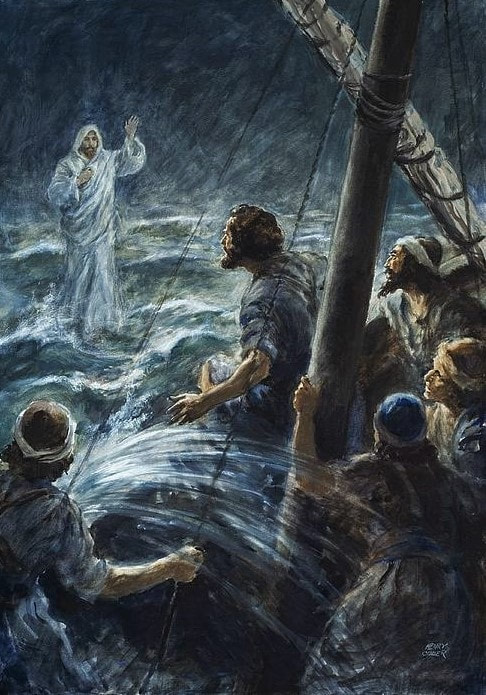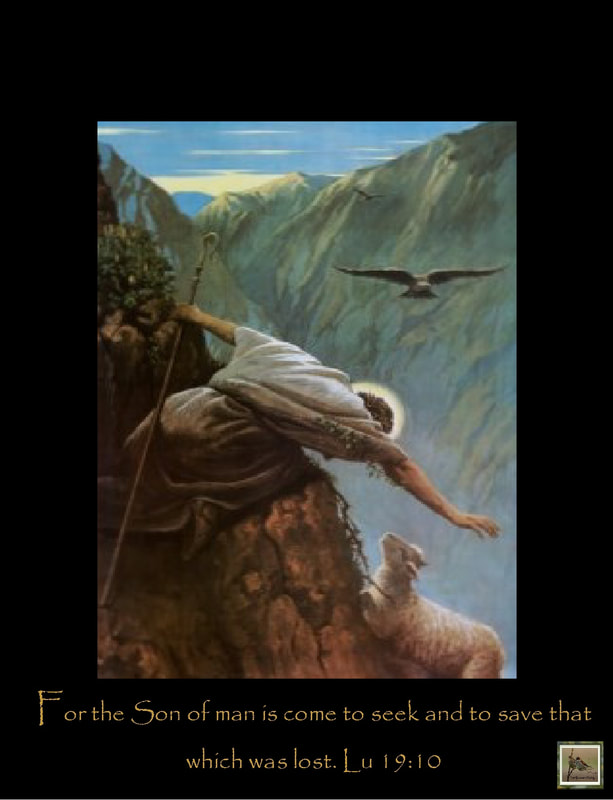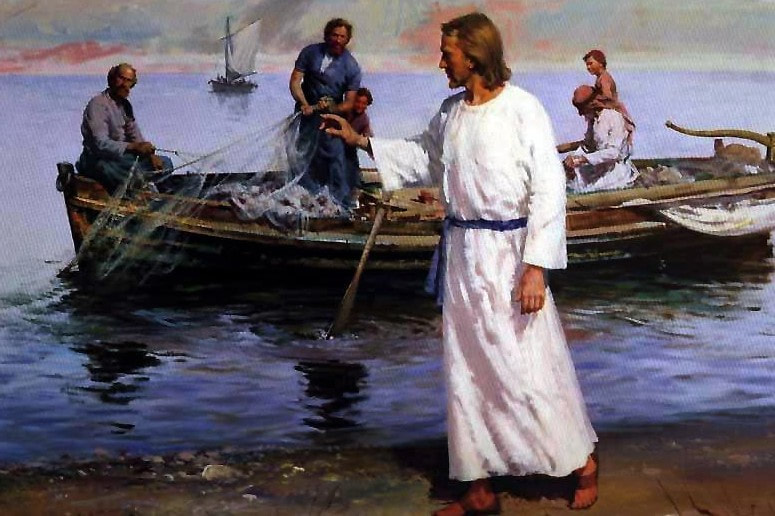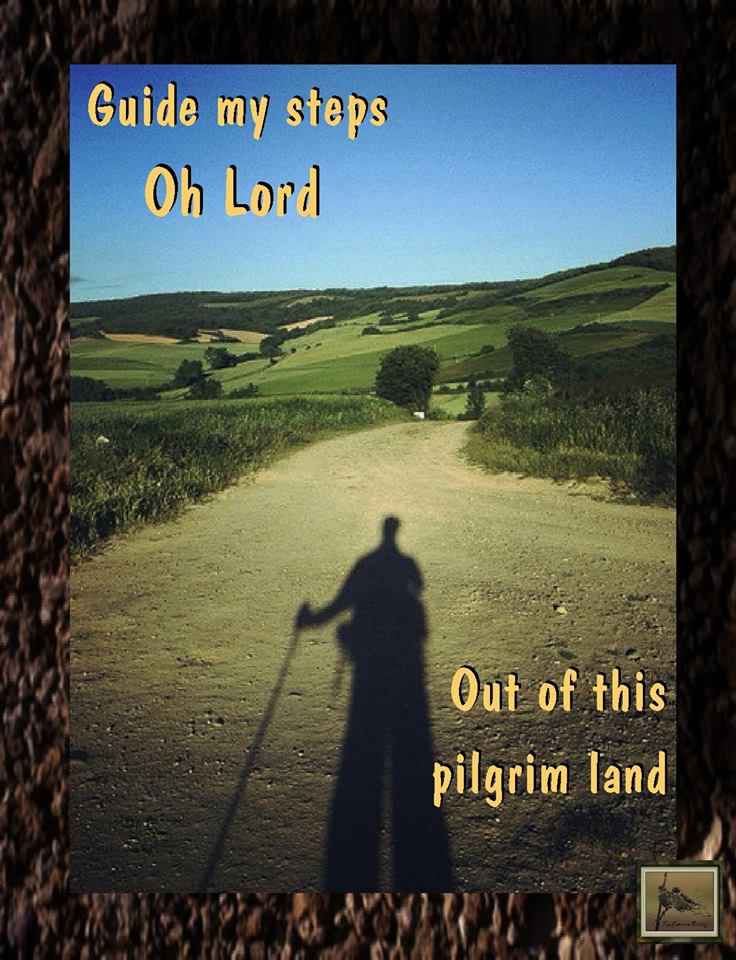To the chief Musician upon Shoshannim, A Psalm of David. Save me, O God; for the waters are come in unto my soul.
I sink in deep mire, where there is no standing: I am come into deep waters, where the floods overflow me.
I am weary of my crying: my throat is dried: mine eyes fail while
I wait for my God.
They that hate me without a cause are more than the hairs of mine head: they that would destroy me, being mine enemies wrongfully, are mighty: then I restored that which I took not away. Psalm 69:1-4
I sink in deep mire, where there is no standing: I am come into deep waters, where the floods overflow me.
I am weary of my crying: my throat is dried: mine eyes fail while
I wait for my God.
They that hate me without a cause are more than the hairs of mine head: they that would destroy me, being mine enemies wrongfully, are mighty: then I restored that which I took not away. Psalm 69:1-4
In the bible there are several references of deep waters. In this devotion, two will be focused on. First, Psalm 69, a psalm of David.
From the Treasury of David, C.H. Spurgeon gives insight, and commentary. I don't believe anyone else could bring clarity to these verses any better. Through Spurgeon's descriptions of Jesus in these verses-we can see that our Lord knows all our sorrows, and is well-acquainted with all evils we may face in this life. When we call on Him, He is faithful, and just, and understands our frame, and has gone the way before us.
Psalm 69:1
“Save me, O God.” “He saved others, himself he cannot save.” With strong cryings and tears he offered up prayers and supplications unto him that was able to save him from death, and was heard in that he feared (Heb_5:7). Thus David had prayed, and here his Son and Lord utters the same cry. This is the second Psalm which begins with a “Save me, O God,” and the former (Psa_54:1-7) is but a short summary of this more lengthened complaint. It is remarkable that such a scene of woe should be presented to us immediately after the jubilant ascension hymn of the last Psalm, but this only shows how interwoven are the glories and the sorrows of our ever-blessed Redeemer. The head which now is crowned with glory is the same which wore the thorns; he to whom we pray, “Save us, O God,” is the selfsame person who cried, “Save me, O God.” “For the waters are come in unto my soul.” Sorrows, deep, abounding, deadly, had penetrated his inner nature. Bodily anguish is not his first complaint; he begins not with the gall which embittered his lips, but with the mighty griefs which broke into his heart. All the sea outside a vessel is less to be feared than that which finds its way into the hold. A wounded spirit who can bear. Our Lord in this verse is seen before us as a Jonah, crying, “The waters compassed me about, even to the soul.” He was doing business for us on the great waters, at his Father's command; the stormy wind was lifting up the waves thereof, and he went down to the depths till his soul was melted because of trouble. In all this he has sympathy with us, and is able to succour us when we, like Peter, beginning to sink, cry to him, “Lord, save, or we perish.”
Psa_69:2
“I sink in deep mire.” In water one might swim, but in mud and mire all struggling is hopeless; the mire sucks down its victim. “Where there is no standing.” Everything gave way under the Sufferer; he could not get foothold for support - this is a worse fate than drowning. Here our Lord pictures the close, clinging nature of his heart's woes. “He began to be sorrowful, and very heavy.” Sin is as mire for its filthiness, and the holy soul of the Saviour must have loathed even that connection with it which was necessary for its expiation. His pure and sensitive nature seemed to sink in it, for it was not his element, he was not like us born and acclimatised to this great dismal swamp. Here our Redeemer became another Jeremiah, of whom it is recorded (Jer.' Jer_38:6) that his enemies cast him into a dungeon wherein “was no water, but mire: so Jeremiah sunk in the mire.” Let our hearts feel the emotions, both of contrition and gratitude, as we see in this simile the deep humiliation of our Lord. “I am come into deep waters, where the floods overflow me.” The sorrow gathers even greater force; he is as one cast into the sea, the waters cover his head. His sorrows were first within, then around, and now above him. Our lord was no faint-hearted sentimentalist; his were real woes, and though he bore them heroically, yet were they terrible even to him. His sufferings were unlike all others in degree, the waters were such as soaked into the soul; the mire was the mire of the abyss itself, and the floods Were deep and overflowing. To us the promise is, “the rivers shall not overflow thee,” but no such word of consolation was vouchsafed to him. My soul, thy Well-beloved endured all this for thee many waters could not quench his love, neither could the floods drown it; and, because of this, thou hast the rich benefit of that covenant assurance, “as I have sworn that the waters of Noah should no more go over the earth; so have I sworn that I would not be wroth with thee, nor rebuke thee.” He stemmed the torrent of almighty wrath, that we might for ever rest in Jehovah's love.
Psa_69:3
“I am weary of my crying.” Not of it, but by it, with it. He had prayed till he sweat great drops of blood, and well might physical weariness intervene. “My throat is dried,” parched, and inflamed. Long pleading with awful fervour had scorched his throat as with flames of fire. Few, very few, of his saints follow their Lord in prayer as far as this. We are, it is to be feared, more likely to be hoarse with talking frivolities to men than by pleading with God; yet our sinful nature demands more prayer than his perfect humanity might seem to need. His prayers should shame us into fervour. Our Lord's supplications were salted with fire, they were hot with agony; and hence they weakened his system, and made him “a weary man and full of woes.” “Mine eyes Jail While I wait for my God.” He wanted in his direst distress nothing more than his God; that would be all in all to him. Many of us know what watching and waiting mean; and we know something of the failing eye when hope is long deferred: but in all this Jesus bears the palm; no eyes ever failed as his did or for so deep a cause. No painter can ever depict those eyes; their pencils fail in every feature of his all fair but: all marred countenance, but most of all do they come short when they venture to pourtray those eyes which were fountains of tears. He knew how both to pray and to watch, and he would have us learn the like. There are times when we should pray till the throat is dry, and watch till the eyes grow dim. Only thus can we have fellowship with him in his sufferings. What! can we not watch with him one hour? Does the flesh shrink back? O cruel flesh to be so tender of thyself, and so ungenerous to thy Lord!
Psa_69:4
“They that hate me.” Surprising sin that men should hate the altogether lovely one, truly is it added, “without a cause,” for reason there was none for this senseless enmity. He neither blasphemed God, nor injured man. As Samuel said: “Whose ox have I taken? or whose ass have I taken? or whom have I defrauded? Whom have I oppressed?” Even so might Jesus enquire. Besides, he had not only done us no evil, but he had bestowed countless and priceless benefits. Well might he demand, “For which of these works do ye stone me?” Yet from his cradle to his cross, beginning with Herod and not ending with Judas, he had foes without number; and he justly said, they “are more than the hairs of mine head.” was the unanimous resolve of all the keepers of the Jewish vineyard; while the Gentiles outside the walls of the garden furnished the instruments for his murder, and actually did the deed. The hosts of earth and hell, banded together, made up vast legions of antagonists, none of whom had any just ground for hating him. They that would destroy me, being mine enemies wrongfully, are mighty.” It was bad that they were many, but worse that they were mighty. All the ecclesiastical and military powers of his country were arrayed against him. The might of the Sanhedrin, the mob, and the Roman legions were combined in one for his utter destruction, “Away with such a fellow from this earth; it is not fit that he should live,” was the shout of his ferocious foes. David's adversaries were on the throne when he was hiding in caverns, and our Lord's enemies were the great ones of the earth; while he, of whom the world was not worthy, was reproached of men and despised of the people. “Then I restored that which I took not away.” Though innocent, he was treated guilty. Though David had no share in plots against Saul, yet he was held accountable for them. In reference to our Lord, it may be truly said that he restores what he took not away; for he gives back to the injured honour of God a recompense, and to man his lost happiness, though the insult of the one and the fall of the other were neither of them, in any sense, his doings. Usually, when the ruler sins the people suffer, but here the proverb is reversed - the sheep go astray, and their wanderings are laid at the Shepherd's door."
Scripture to ponder:
Joh 15:18 If the world hate you, ye know that it hated me before it hated you.
Joh 15:19 If ye were of the world, the world would love his own: but because ye are not of the world, but I have chosen you out of the world, therefore the world hateth you.
Joh 15:20 Remember the word that I said unto you, The servant is not greater than his lord. If they have persecuted me, they will also persecute you; if they have kept my saying, they will keep yours also.
Joh 15:21 But all these things will they do unto you for my name's sake, because they know not him that sent me.
Joh 15:22 If I had not come and spoken unto them, they had not had sin: but now they have no cloke for their sin.
Joh 15:23 He that hateth me hateth my Father also.
From the Treasury of David, C.H. Spurgeon gives insight, and commentary. I don't believe anyone else could bring clarity to these verses any better. Through Spurgeon's descriptions of Jesus in these verses-we can see that our Lord knows all our sorrows, and is well-acquainted with all evils we may face in this life. When we call on Him, He is faithful, and just, and understands our frame, and has gone the way before us.
Psalm 69:1
“Save me, O God.” “He saved others, himself he cannot save.” With strong cryings and tears he offered up prayers and supplications unto him that was able to save him from death, and was heard in that he feared (Heb_5:7). Thus David had prayed, and here his Son and Lord utters the same cry. This is the second Psalm which begins with a “Save me, O God,” and the former (Psa_54:1-7) is but a short summary of this more lengthened complaint. It is remarkable that such a scene of woe should be presented to us immediately after the jubilant ascension hymn of the last Psalm, but this only shows how interwoven are the glories and the sorrows of our ever-blessed Redeemer. The head which now is crowned with glory is the same which wore the thorns; he to whom we pray, “Save us, O God,” is the selfsame person who cried, “Save me, O God.” “For the waters are come in unto my soul.” Sorrows, deep, abounding, deadly, had penetrated his inner nature. Bodily anguish is not his first complaint; he begins not with the gall which embittered his lips, but with the mighty griefs which broke into his heart. All the sea outside a vessel is less to be feared than that which finds its way into the hold. A wounded spirit who can bear. Our Lord in this verse is seen before us as a Jonah, crying, “The waters compassed me about, even to the soul.” He was doing business for us on the great waters, at his Father's command; the stormy wind was lifting up the waves thereof, and he went down to the depths till his soul was melted because of trouble. In all this he has sympathy with us, and is able to succour us when we, like Peter, beginning to sink, cry to him, “Lord, save, or we perish.”
Psa_69:2
“I sink in deep mire.” In water one might swim, but in mud and mire all struggling is hopeless; the mire sucks down its victim. “Where there is no standing.” Everything gave way under the Sufferer; he could not get foothold for support - this is a worse fate than drowning. Here our Lord pictures the close, clinging nature of his heart's woes. “He began to be sorrowful, and very heavy.” Sin is as mire for its filthiness, and the holy soul of the Saviour must have loathed even that connection with it which was necessary for its expiation. His pure and sensitive nature seemed to sink in it, for it was not his element, he was not like us born and acclimatised to this great dismal swamp. Here our Redeemer became another Jeremiah, of whom it is recorded (Jer.' Jer_38:6) that his enemies cast him into a dungeon wherein “was no water, but mire: so Jeremiah sunk in the mire.” Let our hearts feel the emotions, both of contrition and gratitude, as we see in this simile the deep humiliation of our Lord. “I am come into deep waters, where the floods overflow me.” The sorrow gathers even greater force; he is as one cast into the sea, the waters cover his head. His sorrows were first within, then around, and now above him. Our lord was no faint-hearted sentimentalist; his were real woes, and though he bore them heroically, yet were they terrible even to him. His sufferings were unlike all others in degree, the waters were such as soaked into the soul; the mire was the mire of the abyss itself, and the floods Were deep and overflowing. To us the promise is, “the rivers shall not overflow thee,” but no such word of consolation was vouchsafed to him. My soul, thy Well-beloved endured all this for thee many waters could not quench his love, neither could the floods drown it; and, because of this, thou hast the rich benefit of that covenant assurance, “as I have sworn that the waters of Noah should no more go over the earth; so have I sworn that I would not be wroth with thee, nor rebuke thee.” He stemmed the torrent of almighty wrath, that we might for ever rest in Jehovah's love.
Psa_69:3
“I am weary of my crying.” Not of it, but by it, with it. He had prayed till he sweat great drops of blood, and well might physical weariness intervene. “My throat is dried,” parched, and inflamed. Long pleading with awful fervour had scorched his throat as with flames of fire. Few, very few, of his saints follow their Lord in prayer as far as this. We are, it is to be feared, more likely to be hoarse with talking frivolities to men than by pleading with God; yet our sinful nature demands more prayer than his perfect humanity might seem to need. His prayers should shame us into fervour. Our Lord's supplications were salted with fire, they were hot with agony; and hence they weakened his system, and made him “a weary man and full of woes.” “Mine eyes Jail While I wait for my God.” He wanted in his direst distress nothing more than his God; that would be all in all to him. Many of us know what watching and waiting mean; and we know something of the failing eye when hope is long deferred: but in all this Jesus bears the palm; no eyes ever failed as his did or for so deep a cause. No painter can ever depict those eyes; their pencils fail in every feature of his all fair but: all marred countenance, but most of all do they come short when they venture to pourtray those eyes which were fountains of tears. He knew how both to pray and to watch, and he would have us learn the like. There are times when we should pray till the throat is dry, and watch till the eyes grow dim. Only thus can we have fellowship with him in his sufferings. What! can we not watch with him one hour? Does the flesh shrink back? O cruel flesh to be so tender of thyself, and so ungenerous to thy Lord!
Psa_69:4
“They that hate me.” Surprising sin that men should hate the altogether lovely one, truly is it added, “without a cause,” for reason there was none for this senseless enmity. He neither blasphemed God, nor injured man. As Samuel said: “Whose ox have I taken? or whose ass have I taken? or whom have I defrauded? Whom have I oppressed?” Even so might Jesus enquire. Besides, he had not only done us no evil, but he had bestowed countless and priceless benefits. Well might he demand, “For which of these works do ye stone me?” Yet from his cradle to his cross, beginning with Herod and not ending with Judas, he had foes without number; and he justly said, they “are more than the hairs of mine head.” was the unanimous resolve of all the keepers of the Jewish vineyard; while the Gentiles outside the walls of the garden furnished the instruments for his murder, and actually did the deed. The hosts of earth and hell, banded together, made up vast legions of antagonists, none of whom had any just ground for hating him. They that would destroy me, being mine enemies wrongfully, are mighty.” It was bad that they were many, but worse that they were mighty. All the ecclesiastical and military powers of his country were arrayed against him. The might of the Sanhedrin, the mob, and the Roman legions were combined in one for his utter destruction, “Away with such a fellow from this earth; it is not fit that he should live,” was the shout of his ferocious foes. David's adversaries were on the throne when he was hiding in caverns, and our Lord's enemies were the great ones of the earth; while he, of whom the world was not worthy, was reproached of men and despised of the people. “Then I restored that which I took not away.” Though innocent, he was treated guilty. Though David had no share in plots against Saul, yet he was held accountable for them. In reference to our Lord, it may be truly said that he restores what he took not away; for he gives back to the injured honour of God a recompense, and to man his lost happiness, though the insult of the one and the fall of the other were neither of them, in any sense, his doings. Usually, when the ruler sins the people suffer, but here the proverb is reversed - the sheep go astray, and their wanderings are laid at the Shepherd's door."
Scripture to ponder:
Joh 15:18 If the world hate you, ye know that it hated me before it hated you.
Joh 15:19 If ye were of the world, the world would love his own: but because ye are not of the world, but I have chosen you out of the world, therefore the world hateth you.
Joh 15:20 Remember the word that I said unto you, The servant is not greater than his lord. If they have persecuted me, they will also persecute you; if they have kept my saying, they will keep yours also.
Joh 15:21 But all these things will they do unto you for my name's sake, because they know not him that sent me.
Joh 15:22 If I had not come and spoken unto them, they had not had sin: but now they have no cloke for their sin.
Joh 15:23 He that hateth me hateth my Father also.
Wellsprings From a Wise Man
The words of a man's mouth are as deep waters, and the wellspring of wisdom as a flowing brook. Pro 18:4
In the second focus on deep waters, we will glean some aspects from Proverbs 18:4. This verse speaks of someone who's depth of soul, and wisdom that resides in him-is as a flowing brook of clean fresh water. His words are clear, and bright. The content of his heart comes forth with wise counsel, and soundness.
Insights from John Gill:
"The words of a man's mouth are as deep waters,.... The words of a great and mighty man; of an excellent and valuable man, as Jarchi; or of a wise man, as Aben Ezra. The doctrines which such a man has imbibed, and his heart is full of and his mouth utters, are like to "waters", pure, purifying, and refreshing; to "deep waters", which make no noise, and cannot be easily fathomed: such are the deep mysteries of grace, the wisdom of God in a mystery, spoken among them that are perfect; of which a good man makes no boast, but humbly declares; out of the abundance of his heart, his mouth speaks;
and the wellspring of wisdom as a flowing brook; there is a spring of spiritual wisdom and knowledge in him; a well of living water, springing up unto everlasting life; and from thence it flows freely and constantly; communicating itself liberally unto others, and ministering grace to the hearers, for their edification."
A person who is described in this verse emanates certain qualities:
1. They speak truth, and it is evident.
2. They are devout in honor to God
3. They earnestly aspire to bring the message of God, revealing Him in speech and their pattern of life.
4. Their words not only refresh and fertilize other's, they also convict, and sting. A paradox-but consistent with the teachings of God's word. John the Baptist, the disciples, and Jesus spoke with the same double-edged sword.
When someone is in this category there will be a lifetime of paradoxes. Some will be drawn to hear and know the truth that comes from them-other's will be repelled, and will hate them and what is said, because it convicts and reveals who and what they are, and the sin within.
The more you follow after God, the less you will fit in with the world. Jesus says it will be this way-and he lived it. The more you seek after the Lord, the less you'll want to fit in. The road will become narrower, and lonelier. Few will want to follow, because the deeper you go with God, the less those of this world, will want your company. The longer you follow God, the less you'll have to say to this world, or those who enjoy the pleasures of sin in it.
It will become an ongoing struggle to try to keep people happy, and stay with them, even as your spirit is warning you that keeping company with them is leading you back into sin, and away from the Lord. You'll have to make up your mind-will you follow God, or stay with the people of the world. You can't have it both ways-but many try to do just that.
Choose the deep waters-go on with God. Let God draw you into His realm, you won't regret it. Let Him mold you, and make you into the person He always intended you to be. Don't let the world, and those who love it-take away what is truly precious, and priceless. Jesus is worth it. He is the pearl of great price.
Lorna Couillard
Insights from John Gill:
"The words of a man's mouth are as deep waters,.... The words of a great and mighty man; of an excellent and valuable man, as Jarchi; or of a wise man, as Aben Ezra. The doctrines which such a man has imbibed, and his heart is full of and his mouth utters, are like to "waters", pure, purifying, and refreshing; to "deep waters", which make no noise, and cannot be easily fathomed: such are the deep mysteries of grace, the wisdom of God in a mystery, spoken among them that are perfect; of which a good man makes no boast, but humbly declares; out of the abundance of his heart, his mouth speaks;
and the wellspring of wisdom as a flowing brook; there is a spring of spiritual wisdom and knowledge in him; a well of living water, springing up unto everlasting life; and from thence it flows freely and constantly; communicating itself liberally unto others, and ministering grace to the hearers, for their edification."
A person who is described in this verse emanates certain qualities:
1. They speak truth, and it is evident.
2. They are devout in honor to God
3. They earnestly aspire to bring the message of God, revealing Him in speech and their pattern of life.
4. Their words not only refresh and fertilize other's, they also convict, and sting. A paradox-but consistent with the teachings of God's word. John the Baptist, the disciples, and Jesus spoke with the same double-edged sword.
When someone is in this category there will be a lifetime of paradoxes. Some will be drawn to hear and know the truth that comes from them-other's will be repelled, and will hate them and what is said, because it convicts and reveals who and what they are, and the sin within.
The more you follow after God, the less you will fit in with the world. Jesus says it will be this way-and he lived it. The more you seek after the Lord, the less you'll want to fit in. The road will become narrower, and lonelier. Few will want to follow, because the deeper you go with God, the less those of this world, will want your company. The longer you follow God, the less you'll have to say to this world, or those who enjoy the pleasures of sin in it.
It will become an ongoing struggle to try to keep people happy, and stay with them, even as your spirit is warning you that keeping company with them is leading you back into sin, and away from the Lord. You'll have to make up your mind-will you follow God, or stay with the people of the world. You can't have it both ways-but many try to do just that.
Choose the deep waters-go on with God. Let God draw you into His realm, you won't regret it. Let Him mold you, and make you into the person He always intended you to be. Don't let the world, and those who love it-take away what is truly precious, and priceless. Jesus is worth it. He is the pearl of great price.
Lorna Couillard
















